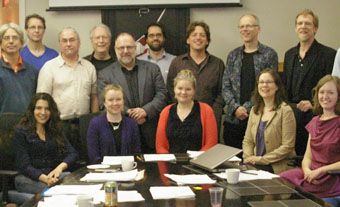Competitors for "Canadian Idol" are selected from auditions by thousands of young people (ages 16-26) in 9-14 cities. After about 20 episodes, a season arrives at a group of 10 (11 in the first season) finalists. After each of the final 7-9 episodes is aired, viewers vote by telephone or text message to determine which finalists will continue. At first, 2-4 of the finalists with the lowest number of votes are voted off of the show each week. Towards the end of each season, only one of the remaining finalists is voted off each week.
The winners of "Canadian Idol" have been Ryan Malcolm (2003, singing "Something More"); Kalan Porter (2004, "Awake in a Dream"); Melissa O'Neil (2005, "Alive"); Eva Avila (2006, "Meant to Fly"); Brian Melo (2007, "All I Ever Wanted"); and Theo Tams (2008, "Sing"). All winners have released singles; the first four (in addition to many non-winners) have released albums. Porter and Avila have both released two albums, as has Season 2 second-runner-up Jacob Hoggard (with the rock band Hedley). Porter has been especially successful, with the highest-selling single in Canadian history ("Awake in a Dream"); double-platinum sales certification (200,000 copies) for his debut album 219 Days; three Juno award nominations; and being voted fan favourite Canadian artist at the MuchMusic Video Awards.
Controversies and Issues
In 2006, a "Canadian Idol" controversy erupted when Avila's debut single was made available for download one day before the announcement of her Season 4 victory. She won in the show's closest final, only 3.3 per cent (131,000 votes) over her rival. Another controversy involved the show's purported two-hour voting window. Due to the live broadcast being time-delayed in some of the six time zones, some viewers were able to vote for up to two hours before the relevant episode aired in their region and others for up to four hours after the broadcast ended.
Singles and albums by "Canadian Idol" winners are released by Sony BMG, and the winners (sometimes with non-winners) also tour the country. All of this is paid for by the businesses involved in making the show, and one could certainly question the extent to which this is a kind of "payola." Also along these lines, CTV frequently advertises releases or tours by contestants as "sponsors" of many of its other programs, but an album or single purported as "new" is sometimes more than a year old.
The combination of several artists on one tour is not surprising, given the limited amount of material performed by many of these singers. "Canadian Idol" contestants perform "covers" (versions of material made famous by other performers). This approach has met with considerable skepticism by musicians and fans who believe that musicians should pay their dues performing in local college venues and bars, building songwriting skills, and making independent recordings before being unleashed on a national audience that is looking for instant stars from among singers as young as 17-year-old O'Neil.
On "Canadian Idol," fan voting and the judges' opinions usually have little basis in anything other than existing predilections for certain songs and styles. Ultimately, the judges have no function beyond entertainment value; the singer determined to be the judges' choice is often voted off of the show several weeks before the season finale. "Canadian Idol" is essentially a music-related version of such reality TV game shows as "Survivor," except that it also preys on the public's surface fascination for transient pop stars. It has yet to be determined whether more than a small fraction of "Canadian Idol" contestants will become significant artists with careers lasting beyond their fleeting associations with the show.
Canadian Content; Themes
The "Canadian Idol" show fulfills its broadcast obligation of Canadian content no matter what music is performed, because the singers, supporting musicians, and production crew are Canadians. Each season has included at least one episode featuring songs related to a Canadian theme or artist: Canadian hits, Gordon Lightfoot, the Guess Who, the Barenaked Ladies, Canadian rock, Anne Murray, and Bryan Adams. All of the 2004 (Season 2) finalists performed instrumental accompaniments for a group version of Gordon Lightfoot's 1967 song "Canadian Railroad Trilogy." (This self-accompaniment was unprecedented on any show of this type, in any country.)
Non-Canadian themes have centred on Motown, summertime hits, love songs, British Invasion, rock 'n' roll, standards, the 1980s, big band, classic rock, unplugged numbers, country standards, number one hits, the 1960s, pop-rock, rock 'n' roll heaven, and top 10 UK hits. Non-Canadian, artist-specific themes have focused on songs by five British artists or groups (Elton John, the Rolling Stones, Queen, David Bowie, and the Beatles) and three US artists (Lionel Richie, Stevie Wonder, and Elvis Presley).
See also Maclean's articles Ben Mulroney; Kalan Porter

 Share on Facebook
Share on Facebook Share on X
Share on X Share by Email
Share by Email Share on Google Classroom
Share on Google Classroom

